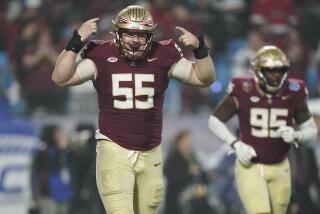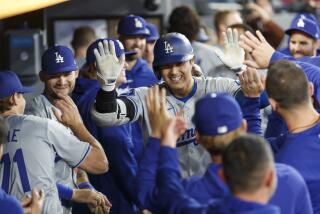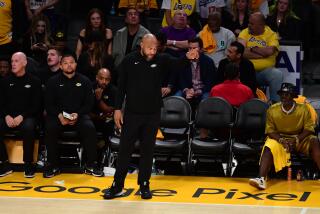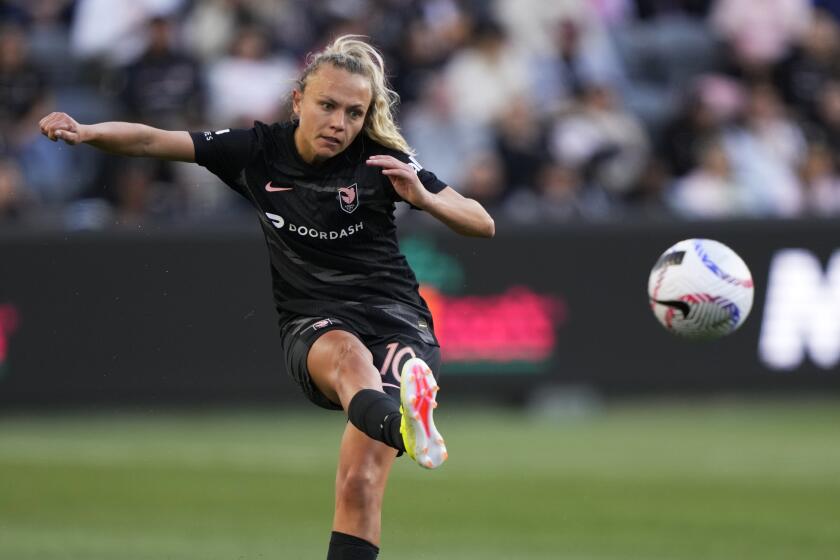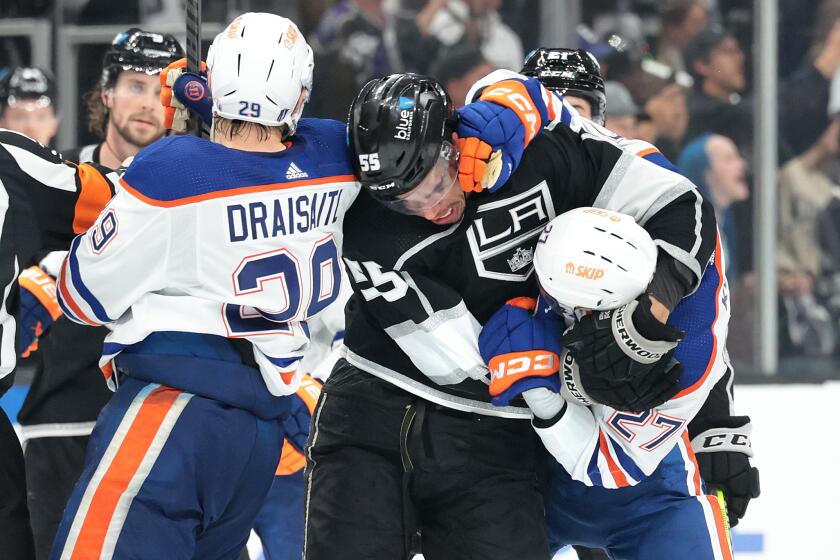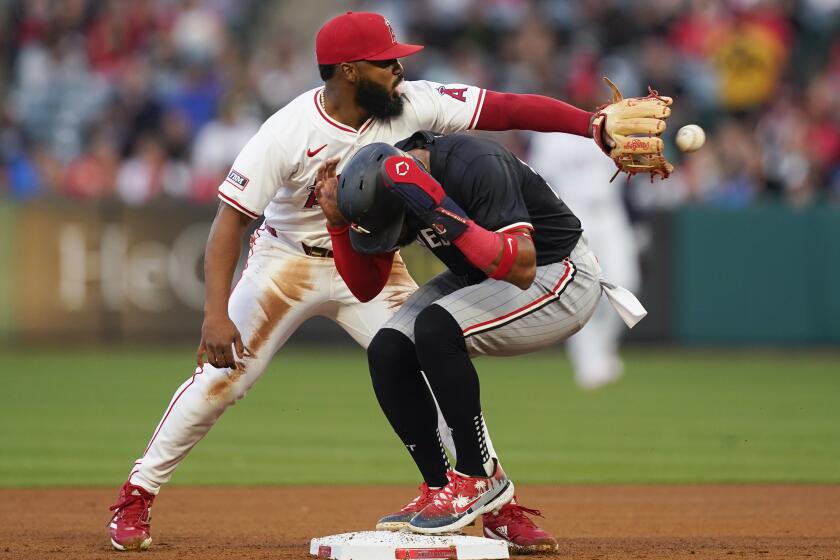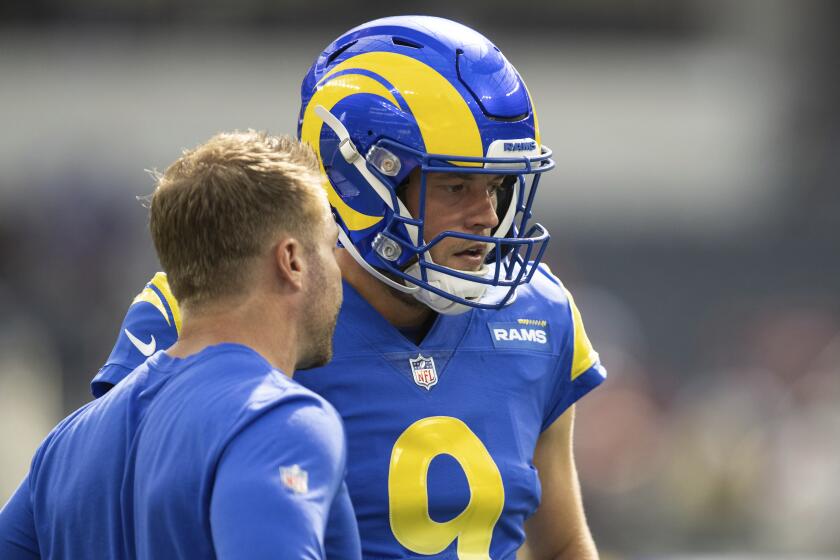Whaddya Mean No Man Is an Island? : Baltimore Orioles owner Peter Angelos has managed to alienate the commissioner and all the other baseball owners. No matter what happens with the strike, is he going to pay for that?
Peter G. Angelos, in his usual impeccable business suit, is standing behind his desk on the 18th floor of his law offices, his back to the glittering night lights of Baltimore. He is trying to autograph a baseball, but the hard curves of the ball disorient him. He’s accustomed to signing flat legal documents, not hard, round, intractable objects. “Jeez-us, I can’t do this!” the owner of the Baltimore Orioles moans. “I’m a lawyer, not a ballplayer.” He struggles to sign the elusive object, then sits down, taking a tissue and rubbing at a red, swollen eye.
Angelos has conjunctivitis. The infection, among other things, has put him in an uncharacteristically foul mood. The day before, he received a letter from the American League that threatened him with sanctions should he refuse to use replacement players if the strike by the Major League Players Assn. continues past opening day, April 2. On this day, he read in the newspapers that the major baseball owners’ executive council had recommended granting expansion franchises to a couple of metropolitan areas: Phoenix, Ariz., St. Petersburg, Fla., or northern Virginia. The first two teams were often mentioned as expansion possibilities, but the northern Virginia team is a new addition. That team would be located about 20 to 75 miles from Baltimore and would eat into the Orioles’ fan base.
For the record:
12:00 a.m. March 19, 1995 For the Record
Los Angeles Times Sunday March 19, 1995 Home Edition Los Angeles Times Magazine Page 11 Times Magazine Desk 1 inches; 24 words Type of Material: Correction
The photographer for the picture of Peter Angelos on Page 12 of the Feb. 26 issue was incorrectly identified. The photograph should have been credited to Patrick Harbron.
“They’re gonna retaliate against me, those a- -holes,” grouses Angelos. He suspects that the northern Virginia idea is probably the work of Milwaukee Brewers owner and acting baseball commissioner Allan H. (Bud) Selig, a ploy to pressure Angelos to back off from his criticism of Selig and his strategies in the team owners’ negotiations with the players.
“Absolutely untrue,” Selig says. “These cities applied and (the northern Virginia group) made a very good proposal.” Says Jerry McMorris, owner of the expansion-team Colorado Rockies: “To hurt Mr. Angelos was not how we determined this decision to place a team in northern Virginia.”
Angelos has always been against expansion, he says, until the existing teams, which are losing money, are “stabilized.” “If certain teams like the Brewers can’t make money, then maybe they should be relocated to cities that’ll support them.” Then, his voice rising in anger, Angelos snaps, “Who says we need 28 teams in baseball? Or 30? Once we had only 16. The only reason the owners want it is because they’ll share in the money”--namely, the $150-million or so that an expansion team pays to join the big leagues.
Angelos has reason to feel that Selig and his cohorts may not have his best interests in mind these days. When the other owners signed a document last fall canceling the rest of the season and the World Series, Angelos was the only one of the 28 owners who refused to sign it because it blamed the players for the impasse.
When the owners appointed a committee to bargain with the players in an attempt to settle the strike, they deliberately excluded an owner with extensive experience as a labor-management negotiator: Angelos.
When the owners voted in December to renew the five-year agreement that preserves the comissioner’s relationship with the leagues, Angelos was the only owner to vote against it. Angelos says he intended it as a vote against Selig’s continuing as acting commissioner.
When the player-owner negotiations stalled the same month, owners voted to impose a salary cap on the players; Angelos was one of three owners to vote against the cap.
After the National Labor Relations Board threatened sanctions against the owners for unilaterally imposing the salary cap--a sign of bad faith bargaining, it said--the owners instituted a “luxury tax,” which would tax teams paying more than $35 million in player salaries at the rate of 75% to 100% of the amount over $35 million. In other words, a salary cap.
When the owners’ executive council recommended in January that all owners be required to start the 1995 season using replacement players culled from the ranks of retired major-leaguers, college players and softball teams, Angelos was the only owner to refuse to field such “pickup players”--he will not use the term “replacement players” because he believes there are no “replacements” for major-leaguers. “The product the Orioles deliver to the fans is major-league baseball, not minor-league baseball, not a pickup team or a scrub team or a combination of them all,” he says.
Some Americans seemed to agree with Angelos. In a nationwide USA Today survey that appeared in late January, 48% of 150 fans polled said they would not attend a replacement game; 36% said they would.
But the owners were not impressed with his heresy, and Angelos was threatened with myriad sanctions if he disobeyed Selig’s order. He could be fined $250,000 for every day he refuses to field a replacement team. He could be suspended from baseball. And, finally, he could lose his franchise if the owners decided to force him to sell it. Any or all of these sanctions could be imposed on him per Section 3.8 of baseball’s constitution, which states, “an owner who willfully violates any order” of the league president exhibits “conduct found by the league not in the best interest of baseball.”
As the baseball season drew near, Angelos discussed the possibility of answering the replacement-player order in court. “I would like to see someone argue that it is in the best interest of major-league baseball to recruit and assemble pickup teams and offer them up to the fans of America as legitimate substitutes for major-league baseball,” he told a reporter.
“I won’t mind responding to them,” Angelos says. “This is Selig’s delusion, ill-conceived, ill-advised, bizarre, ludicrous, unconscionable. This is our national game, and this is no way to treat it.”
If a ruling goes against Angelos, he vows to field a team of replacement players but forfeit every game. He says he won’t let Oriole players cross a picket line. “If they tried to,” he says, “I’d tell them they’re nuts and to go home.”
Regardless of what happens with the strike, the street-smart, irascible Angelos has shattered solidarity among the autocratic owners. How this will affect the balance of power between the owners and the players remains to be seen, but this second-generation immigrant, this maverick with a romantic view of the game, has been virtually excluded from current negotiations. Angelos already has observed how vindictive the owners have been toward their adversaries, the players. How vindictive will they be toward one of their own--especially one who breaks their code of silence by sparring in public?
Angelos is aware that he’s “hot-tempered, tempestuous, aggressive, all that crap.” When a baseball owner once berated him for breaking ranks with the others, Angelos told a friend, “The next time I see that son of a bitch, I’m gonna punch him out.” But in a “rational argument,” Angelos says, “I try not to lose my composure.”
It’s not always easy: His struggle is revealed in his contorted features and his hesitant, methodically chosen words whenever he talks about Selig, a man he claims he is “at war with” over baseball. First, he doesn’t think an owner should serve as commisioner. “Selig was a handmaiden of the owners. I doubt that’s an appropriate role for the commissioner to play.”
But, Angelos allows, “Bud Selig has a genuine concern over baseball’s financial problems. And those problems are real. The Tigers and the Astros lost $30 million in the past three years and the Mariners have lost $50 million. But baseball’s financial problems are more personal to Selig because of his own club.” Selig’s Brewers, located in one of the smallest major-league markets, under the shadow of Chicago, have been losing money. County Stadium, where they play, is more than 40 years old (a new ballpark is scheduled to open in 1998). The Brewers lost one of their best players--Paul Molitor, who went on to become the 1993 World Series MVP with the World Champion Toronto Blue Jays--to free agency because Selig couldn’t or wouldn’t pay him what he could earn elsewhere.
“Selig’s methods to resolve baseball’s problems are, how should I put it?” Angelos says. “Amateurish, ineffective and doomed to failure. Watching him is like watching a person put his hand in a buzz saw. You want to shout, ‘You’re splattering blood all over the rest of us!’ ”
At the time he bought the Orioles in 1993, Angelos, like many new owners, knew little about the game. Most baseball owners have made their fortunes in other businesses, such as Michael Illitch of the Detroit Tigers, who founded Little Caesar’s pizza empire, and H. Wayne Huizenga of the Florida Marlins, who built Waste Management into the world’s largest collector of trash and expanded a chain of 19 video stores into Blockbuster Entertainment. Angelos thought he was joining the company of men like himself, who had made their success the hard way. He assumed that like himself, they had a sentimental attachment to the game of baseball. Some of them, like Illitch and Huizenga, also have immigrant backgrounds and saw in the national pastime a symbol of the glories of their adopted homeland.
Angelos also thought he had some practical gifts he could share with his fellow owners. As a labor lawyer, he says, “I understood the labor negotiating process. I understood the players’ unions’ arguments. I thought I could help pick out the owners’ mistakes concerning the players in their negotiations. I could convince them not to see the players as our adversaries, that, like us, they had a legitimate perspective.”
At the third meeting he attended, in Cincinnati in June, 1994, Angelos listened as the executive council proposed a plan to force the players to accept a salary cap and revenue sharing in their ongoing labor negotiations. It was the team owners in large cities who led the way in demanding a cap, while the small-market owners lobbied to spread major-league baseball’s massive profits more evenly in order to maintain competitiveness throughout the leagues. In practice, a salary cap would limit the players’ spiraling salaries by establishing an arbitrary limit on how much all the teams could spend on player salaries. For example, the New York Yankees and the Pittsburgh Pirates would havethe same salary budget. But a team like the Yankees, which makes far more in annual broadcast revenues than a team like the Pirates, would be forced to share some portion of its profits with small-market teams.
Angelos voted for revenue sharing because he felt, as a new owner, he had to defer to his more experienced peers, even though he thought it “was the antithesis of the essence of this country--competition. It was socialistic. It said, if you bust your butt to make money you have to share it with others. But I couldn’t offer an alternative, so I yielded to the consensus.” When the large-market clubs then linked revenue sharing with a salary cap, Angelos was trapped into both postures despite his reservations.
To prove how financially troubled baseball teams are, the owners’ negotiator, Richard Ravitch, presented a slide show at the June meeting that claimed teams would lose more than $100 million that year. When Angelos got a chance to speak, he said Ravitch’s slide show should be shown to the players. “Full financial disclosure of the teams’ financial plights,” Angelos said, would prove the owners’ case. Ravitch refused, saying, “ ‘That’s out of the question. The players won’t be receptive,’ ” Angelos says,
Angelos told Ravitch that if he believed that, he should “resign his position.” The other owners were stunned into silence.
“They said I was speaking too harshly to Ravitch,” recalls Angelos. “They felt they didn’t need my contribution as a newcomer. But it’s not my style to make frivolous suggestions. Besides, I thought their strategy would spell disaster for baseball.”
When that meeting adjourned, nine owners approached Angelos privately and told him they were glad he’d said what he did, he recalls. “They had serious doubts about Ravitch.”
After more meetings over the fall and winter, Angelos felt that he’d overestimated his fellow owners. He found he had nothing in common with them, and, often, they had nothing in common with each other except a single-minded desire “to protect their position.” Still, he doesn’t believe they are all the “dolts and idiots” often depicted in the press. “If we were all a bunch of dummies,” he says, “we wouldn’t have made the money to invest in teams to begin with.”
Angelos describes the owners’ meetings as “silent. The owners don’t say anything. All the substantive issues are left to the executive council,” a committee of 10 owners elected because of seniority or because they are owed favors by friends, according to Angelos. “All debate is behind closed doors. That’s a good system when things are working, but you have to question it when this small committee is (formulating policy) detrimental to baseball. So I asked questions, made suggestions, and as usual was met with stony silence.” When Angelos spoke out against the cap, “I thought my reasonable viewpoint would prevail,” he says. “But they were not accustomed to an open, vigorous discussion intended to arrive at an intelligent decision.”
After Angelos voted against the imposition of the cap, one owner said, “Peter, why don’t you just accept it?”
Angelos said, “Because I don’t believe in it.”
“Neither do I. But I voted for it.”
It was then Angelos realized he’d been deceived, especially by the large-market owners. They had linked the salary cap with revenue sharing “because they believed the players would never accept the cap. Therefore, the large-market owners would never have to share their revenue. It was their protective device. But I didn’t understand that at the time. I thought both parties were acting in good faith for the good of the game.”
Such good faith was not in evidence when President Clinton summoned the two parties to the White House on Feb. 7 to mediate the impasse. Before that meeting, the President said that two groups of millionaires ought to be able to find a way to share a $2-billion pie. After it, he said, “Clearly, they are not capable of settling this strike without an umpire.” The President’s umpire, William J. Usery, had proposed a plan at that meeting that “infuriated” the players because it was essentially the owners’ proposal. One insider says that Usery had asked both sides to submit their proposals, but the players didn’t want to commit themselves. “They won’t negotiate. So Usery only had the owners’ proposal to work with.”
“The President did his level best, “ Angelos says.
A day after Clinton and Usery failed, Sen. Edward M. Kennedy (D-Mass.) and Rep. Pat Williams (D-Mont.) introduced legislation on behalf of the Administration, requiring the feuding players and owners to accept binding arbitration to end the strike. Although Congress did not immediately embrace the legislation, pressure to act is expected to mount with the approach of spring training.
Another kind of pressure on the owners is the National Pastime Preservation Act, submitted by Sen. Daniel Patrick Moynihan (D-N.Y.) in January. The bill that would repeal the antitrust exemption for major-league baseball, restricting the owners’ power over wages and work rules and permitting unfair labor practices to be challenged in federal court (basketball, football and hockey players already have these rights).
Although no newcomer to contentious confrontations, Angelos was surprised to discover that most of the other owners are dictatorial, self-made businessmen not used to rational discourse. They have to defeat the players because they are accustomed to defeating their business adversaries. Angelos, despite his pugnaciousness, is not a man who has to win every argument. He is used to defending his position rationally in court and is an expert at searching for an edge in an argument. But when the truth is someplace between what he wants personally and what he knows is fair, he can accept it.
After the meeting that imposed the salary cap, Angelos decided to make his case publicly, breaking ranks with his fellow owners. Selig has kept those owners united, primarily, Angelos claims, because “he has the repertoire of an accomplished politician. He’s on the phone constantly schmoozing with the owners to keep them in line. I don’t phone anyone. I just say my piece in the meetings, and then I leave.”
Selig has admonished Angelos in private a number of times not to speak out about their disagreements. “Since the day I was born, I spoke out,” says Angelos. “I don’t think I’m the kind of man you tell to shut up. It radiates from me not to talk to me that way.”
“Dissent is honorable, but when you are partners in an enterprise, it’s best to (air it) behind closed doors,” Selig says. “I’m not really frustrated, but I think other people in baseball are.”
Says Colorado Rockies owner Jerry McMorris: “I like Peter. He’s a good guy. Bright. His going public is a difference in style between him and me.
So Angelos has granted numerous interviews and continued to publicize his war against Selig. That war has brought him to where he is now, ostracized by most of his fellow owners as a traitor. He claims a few owners keep in contact with him, but he refuses to divulge their names. “I’m not exactly a voice crying in the wilderness,” he says, laughing. “But I can’t name them. Baseball already has one outcast. I don’t want to put them in Selig’s bad graces. It’s sort of like the Witness Protection Program.”
*
ANGELOS, 65, IS NOT A HANDSOME MAN, ALTHOUGH HE IS VAIN ENOUGH when pouring over photographs of himself. “Jeez! Do I look this frightening?” He has the rubbery, expressive, big-featured face of an Edward G. Robinson. He tends to thrust out his barrel chest when he enters a room, his back stiff, head up, defiant in the manner of cocky little men who do not think of themselves as little. “I am not short!” he insists. “I’m 5-6.”
Despite his expensive suits, silk ties and highly polished black dress shoes, Angelos looks less like a wealthy lawyer than a tough prizefighter. His father, John, and mother, Frances, were Greek immigrants who settled in Baltimore’s lower-middle-class neighborhood of Highlandtown, known as “Greektown.” where he was born on the Fourth of July. John Angelos owned a tavern, where Peter started tending bar in his teens. He learned to drink at an early age, and even today he has the ability to put away vast amounts of alcohol and not show it. He says his father, who spoke mostly Greek at home, never had “philosophical” talks with his son. “He just taught me the usual immigrant credo,” says Angelos. “Work hard, don’t quit and be on the level. He never took a vacation, and I’ve taken only a few in my life. What do I do? I do what my old man did. I work.”
His father’s customers were also working men, whom Angelos grew to admire. “The labor movement is responsible for everything good in America,” Angelos says. His credo is always “to buy American.” When bestselling author Tom Clancy, an Orioles investor, bought a Mercedes-Benz, Angelos called it “a German piece of s- - -.” Clancy has since purchased a Cadillac, the same brand Angelos owns (his wife drives a Lincoln). It is every American’s responsibility, Angelos says, “to buy American, even if it’s inferior to a foreign product. You have to support your fellow Americans.”
Angelos went to the University of Baltimore and then Baltimore Law School at night, where law “became my first love,” he says (his sister is also an attorney, and a grandfather and great-grandfather were lawyers in Greece). He joined law and labor in his practice. Angelos dabbled briefly in politics, becoming a city councilman in 1959 at age 29. In 1966, Angelos married Georgia Kousouris; their two sons, John, 27, and Louis, 25, are now in law school.
Angelos ran for mayor on Baltimore’s first interracial ticket in 1967. “I got clobbered,” he says. As a rookie councilman, he was once subjected to a verbal harangue by an older pol. “After 10 minutes, I decided it was time for Pete to get in the ballgame,” he says. “So I took him on. I lost (the debate), but I learned a few pointers from him.”
This last statement is typical of Angelos. He may be fierce in battle, but he is also magnanimous in defeat. He loves to win, but when he loses, he is not vindictive. He once criticized former Orioles manager Johnny Oates, and when his comments appeared in the Washington Post, Angelos sent a letter of apology to Oates. “I had to eat a crow this big,” he says, spreading his arms wide. Another time, Angelos felt a reporter had betrayed a confidence in a story about him. “I told him I was pissed off,” says Angelos. “I told him not to call me for a month until I get over it, then we’d go to a game together.”
Angelos joined law and labor in his practice, handling product-liability cases for employees, always on contingency-only basis. It’s a kind of legal practice that requires vast confidence, a healthy ego and absolutely no fear of failure. If he wins, he gets one-third of the settlement. If he loses, he gets nothing. Angelos has become a wealthy man, worth somewhere near $400 million. He represents 8,700 steelworkers, shipyard workers and manufacturers’ employees in an ongoing consolidated-action asbestos-poisoning suit that was partially settled in 1992. So far Angelos has earned an estimated $1 billion for those workers, and his cut is estimated at $330 million.
In 1993, Angelos bought the Orioles from Eli Jacobs, a New York venture capitalist, who was described by one reporter as “aloof.” Jacobs was, says one observer, an absentee owner who “didn’t care if the club won or lost as long as his food arrived on time to his bunker (owner’s box).” Angelos paid $173 million for the Orioles, the highest price for a sports franchise at that time. Angelos, who invested about $60 million of his own money--making him majority owner and principal shot caller--assembled a group of local investors (among them Clancy, film director Barry Levinson and tennis player Pam Shriver) and then outbid New York art dealer Jeffrey H. Loria for the team. To Angelos, it was a way for an immigrant son to repay the city for the advantages it gave him growing up.
Now he has another form of repayment in mind: He wants to bring NFL football back to Baltimore, which lost the Colts to Indianapolis in 19TK. He was in active negotiations with Rams owner Georgia Frontiere to buy the Los Angeles Rams, but he lost out to St. Louis over issues of control. He recently lost a bid, to Tampa businessman Malcolm Glazer, for the Tampa Bay Buccaneers.
Angelos has not given up on football. Says former Maryland Gov. William Donald Schaefer, a good friend: “When Pete makes up his mind, nothing stands in the way.”
*
BACK IN HIS OFFICE, ANGELOS IS NURSING HIS BAD EYE AND THE BAD NEWS about the proposed expansion team in the Orioles’ back yard.
Despite his foul mood, he’s determined to keep his word to take a visiting journalist to Greektown for dinner, just as he had promised earlier to sit for some pictures for a photographer because “he’s a local guy. This will be good for his career.”
Angelos is very loyal to local guys. Just as most of the minority partners in the Orioles are from Baltimore, Angelos’ unusually small personal staff is local: his secretary, Mary Jo Oliver; his bodyguard and friend, former city police officer Phil Farace, and his driver and assistant, Bernie Martin. His loyalty to one of his own players, in fact, is one reason he refuses to use replacement players. Cal Ripken, who grew up Havre de Grace, Md., has been the team’s shortstop since 1983, has played in 2,009 consecutive games and could break Lou Gehrig’s record 2,130 successive games if the strike is settled. If Angelos fielded a team of replacement players, Ripken’s streak would be broken. “We’ll do everything to avoid that happening,” Angelos says.
Martin is driving Angelos through the darkened city streets toward Greektown. Stopped at a traffic light in Martin’s Cadillac, Angelos looks out his passenger-side window. The man and woman in the car beside him do a double-take. The man lowers his window and calls out, “We’re with you, Peter!” The woman leans across him and adds, “All the way, Peter.” Angelos nods, thanks them, and they drive off.
One Baltimore councilman has proposed an ordinance to help assure that Angelos won’t have to fight the baseball owners in court. “The Angelos protection act” would prohibit the Orioles from using replacement players to start the season. Councilman Joseph DiBlasi said, “It supports and protects Peter Angelos from the wrath of major-league baseball. Their fight would be with the city.”
Tom Clancy is another of Angelos’ local admirers. “I wouldn’t have invested in the team if Peter wasn’t involved,” says the millionaire author of such thrillers as “The Hunt for Red October” and “A Clear and Present Danger.” “A lot of people said we wouldn’t get along because we’re both the kind of guy who says what he thinks. But that’s precisely why we do get along. Peter has total integrity. He doesn’t have any enemies in Baltimore that I know of.”
Angelos stares, impassive, out of his passenger window. Finally, he says, “Did you see where Gaston isn’t gonna manage replacement players?” The Toronto Blue Jays had just announced that it was releasing manager Cito Gaston and his coaches from the obligation of managing replacement players. “The team is trying to make it look like their idea,” says Angelos. “But I’ll bet you Gaston just refused to do it. Then the Blue Jays waited a few days to make the announcement as if it was their idea.”
Angelos’ stance against using replacements has created a backlash of sympathy for him from active major-leaguers. Two free agents, Montreal Expo John Wetteland and Pittsburgh Pirate Andy Van Slyke, were so impressed with Angelos’ stance they hinted they’d prefer to sign new contracts with him rather than any other team. “Respect, dignity and character,” said Van Slyke, “that’s what has always excited me in people.”
Martin’s Cadillac moves slowly up the hill to Greektown so that Angelos can point out the row house where he was born and raised. It is typical of the city’s row houses as seen in the Barry Levinson movie “Tin Men”: pale brick, three stories, with a spotless gray stone stoop. It is indistinguishable from all the other row houses it is joined to on the block, which is dominated by Greek restaurants. The Cadillac passes a Greek men’s social club, its interior illuminated by bright lights. Men with swept-back black hair and luxuriant, drooping mustaches are sipping coffee while playing cards at a green felt-covered table.
Martin stops the car in front of Zorba’s restaurant, a middle-class bar with a few dining tables at the rear. Most of the men at the bar look like laborers in work clothes. The owner of the restaurant, a young, dark-haired man, leads Angelos and his party to a table close to the kitchen. Slabs of pork, chicken and lamb are roasting on a spit. Angelos orders Greek wine for himself. Martin orders a coke.
Throughout dinner--Greek salad, a heaping plate of roasted meats, octopus marinated in olive oil--the working men at the bar are respectful of Angelos’ privacy in the way of working men toward one they feel is their superior. Every so often, though, they glance over at him, talking, then nod to one another.
The week before, Angelos had walked into an upscale restaurant, Boccaccio’s, and the elegantly dressed diners stopped eating, their forks poised at their lips. As he made his way across the room, nodding to everyone like a politician working the room, Baltimore’s elite smiled after him--not the self-congratulatory smiles of those who have seen someone merely famous, like an actor, but the ethereal smiles of those who have seen someone they worship.
The working men at Zorba’s know Angelos better than do the movers and shakers at Boccaccio’s. They don’t disturb him because they know that, despite his ability to move easily among various social strata, Angelos is not really comfortable with public recognition. He prefers to be out of the spotlight, as he is at Zorba’s, where he looks down at his hands, picking at a wine cork.
“This war (with Selig) has cost me my private life,” he says. “Any fame I’m getting from it, I just want to use to get the job done, then I’ll disappear.” He sighs, as if defeated. “Being part of this baseball group and not making it deal in an equitable fashion is my fault, too,” he adds. “I think it’s a mistake when you feel you can muscle the other side. It means you’re not thinking clearly. I just believe in good business principles. If you treat the fans with respect, give them a good product, you’ll be successful. Hey, listen. I’m an immigrant. We believed all those things they told us about America.”
After dinner, Angelos stands outside of Zorba’s while Martin brings the car around. He notices a man walking toward him in darkness. He calls out, “Michael.” A man in his 50s, dressed in a worn sport coat and a gray V-neck sweater, approaches Angelos with an innocent smile. Angelos speaks to him in Greek, smiling for the first time this evening. Michael Stefanaras is an accountant with a Greektown clientele. The kinds of people Angelos might be dealing with today if his life had taken a different turn.
When the Cadillac pulls up to the curb, Angelos throws his arm over Stefanaras’ shoulders and invites him to join the party for a late-night drink at Jimmy’s.
By the time they reach Jimmy’s, Angelos’ mood has brightened considerably. Maybe it was the wine, or the Greek food, or just the presence of Stefanaras, a man Angelos obviously admires. In his pugnacious, bolt-upright way, Angelos breezes into Jimmy’s, an upscale version of Zorba’s. The patrons at the bar are dressed in their best clothes, the men in business suits, the women in dresses from the better Baltimore department stores. When they see Angelos, they shout “Peter! Over here! Peter!” The men pump his hand. The women hug him and kiss him loudly on the cheek. Jimmy’s wife pushes her two young sons, not yet in their teens, toward Angelos. They stare up at him in awe. Angelos smiles down at them, tousles their black hair, and says in English, “Beautiful boys.” Jimmy’s wife smiles at Angelos’ benediction.
Stefanaras is watching from a distance. He is smiling, too. Then he says to no one in particular, “We’re so proud of Peter. He’s made it, and he’s one of us.”
Late at night, Angelos and his party leave Jimmy’s for the ride back downtown. Driving through the city streets, Angelos looks out the window and says, “Listen, baseball is perfect. It’s the most honest game in American sports. I just want to change the other stuff.”
More to Read
Get our high school sports newsletter
Prep Rally is devoted to the SoCal high school sports experience, bringing you scores, stories and a behind-the-scenes look at what makes prep sports so popular.
You may occasionally receive promotional content from the Los Angeles Times.
